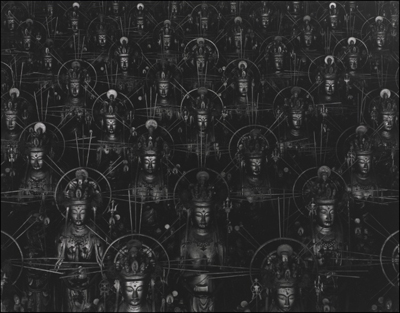“Hall of Thirty-Three Bays” by Hiroshi Sugimoto
A captivatingly atemporal silver gelatin print from 1995:

“Hall of Thirty-Three Bays” by Hiroshi Sugimoto
(Our 400px column width definitely ain’t doing the composition any favors; it’s worth taking the time to view this stunning image as large as possible.)
The work of Tokyo/NYC-based artist and photographer Hiroshi Sugimoto reflects a lifelong fascination with infinity and eternity. He has “spoken of his work as an expression of ‘time exposed’, or photographs serving as a time capsule for a series of events in time. His work also focuses on transience of life, and the conflict between life and death.” (via)
The story behind this particular image: these are the fiercely protected, rarely viewed 1001 statues of the Sanjusangendo, a 390-foot-long wooden temple in Kyoto containing thirty-three bays, also known as Sea of Buddha. Sugimoto was determined to show the statues as they were meant to be viewed during the Heian Perod (794-1185). It took seven years for Sugimoto to get permission to enter the “Hall of Thirty-Three Bays” with his camera equipment and capture the eight-hundred-year-old Armed Merciful Bodhisattva Avalokitesvara figures just as the early morning sunlight hit them, simultaneously illuminating one-thousand-and-one haloes. The resulting imagery is both ancient and somehow futuristic, infinite and immediate.
More beauty from Sugimoto:

November 8th, 2011 at 2:27 pm
Atemporal is a good word for it, indeed.
November 11th, 2011 at 3:45 pm
My new wallpaper
Beautiful. And a friend commented “like an army of Robot Buddhas”